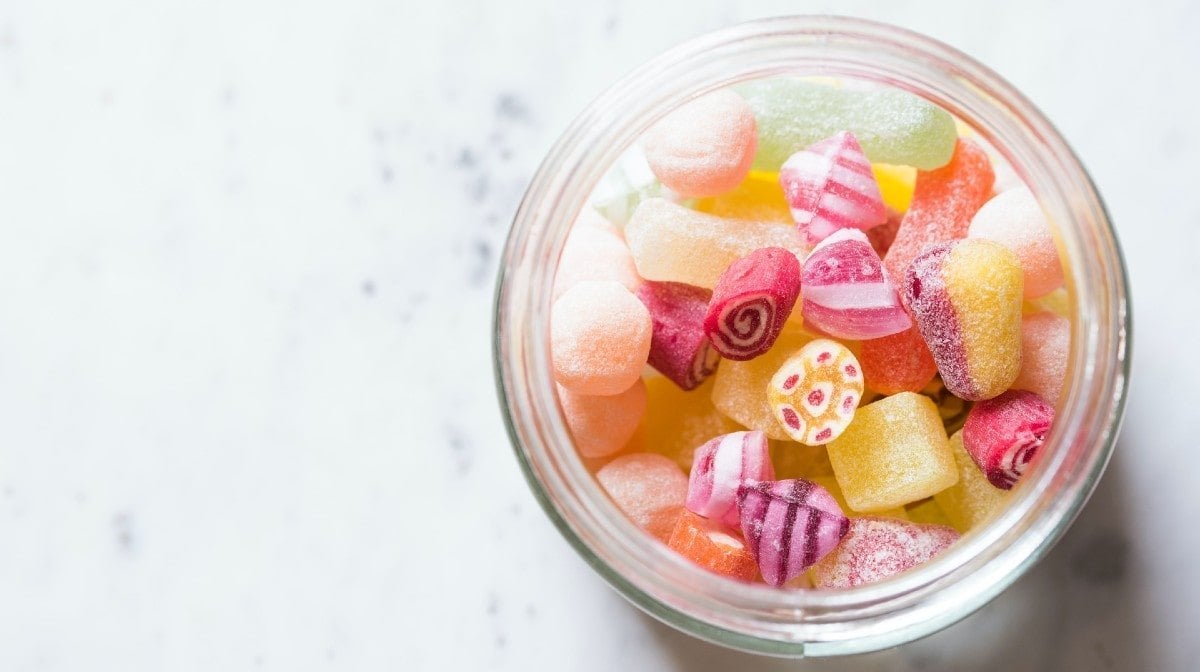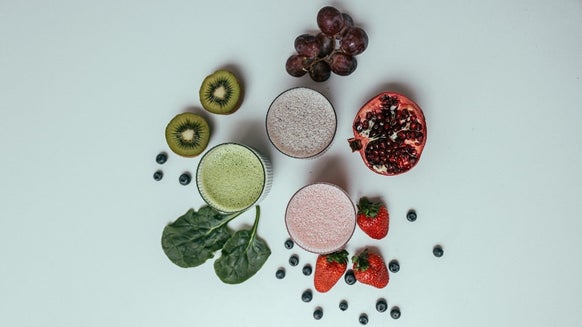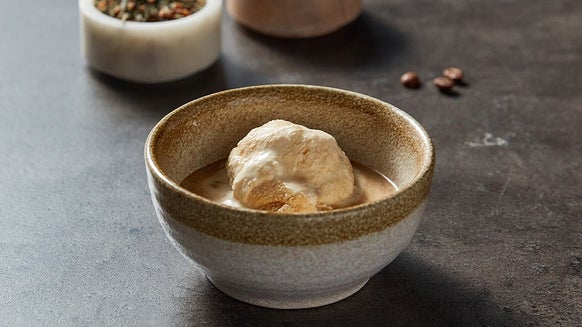
Consuming too much of the sweet stuff can mean your calorie intake is too high which will ultimately lead to weight gain and other potential health problems.1
Whilst sugars found in natural foods, like fruits, come with a range of micronutrients and fibre, free sugars added to drinks and sweets are most detrimental to health and the NHS recommends you do not exceed 30g a day of free sugar.2
When trying to cut down your sugar intake, there are alternatives that will provide a dose of sweetness but not add to your calorie intake or spike your blood sugar – with some better for you than others. Here are 7 alternatives to table sugar:

Alternatives to Sugar
1. Stevia
Stevia is extracted from the Stevia Rebaudiana Bertoni plant found in South America. Although it is 50-300 times sweeter than sugar, it doesn’t contain any calories.3 This makes it a good option for those looking to lose weight whilst following an energy restricted diet plan.
2. Xylitol
Xylitol is a sugar alcohol which despite having a similar sweetness to normal sugar, contains significantly less calories. Xylitol is also lower on the glycaemic index, which is a way to measure how quickly a certain food will increase your blood sugar.5
Glucose has a rating close to 100 whereas xylitol is only 13.6 Xylitol can be found naturally in various fruits, vegetables and oats.6
3. Sorbitol
Like xylitol, sorbitol is a sugar alcohol. Whilst it is not as sweet as table sugar (60% as sweet as table sugar), it contains significantly less calories with 1 gram of sorbitol providing 2.7 calories compared to table sugar which contains 4 calories per gram.6
It is found naturally in fruits such as apples, pears, peaches and apricots and has a low glycaemic index of 9.6 The Joint FAO/WHO Expert Committee on Food Additives have the declared sorbitol as safe with no specified acceptable daily intake. As such there is no limit on how much you can include in your diet, however, excess amounts may have a laxative effect.
4. Erythritol
Another sugar alcohol, erythritol contains less calories per gram than table sugar (sucralose) with only 2.4kcals compared to 4kcals in sucralose.6 Erythritol is found in melons, peaches and fermented foods such as wine, beer and soy sauce.
Another key benefit in comparison to table sugar is that there is no effect of erythritol consumption on tooth decay.6 Unlike other alcohol sugars, the digestive system has a high tolerance for erythritol so it is less likely there will be any sort of laxative effect.6
5. Aspartame
Aspartame is an artificial sweetener commonly found in ‘diet’ or ‘sugar free’ drinks. Its approximately 200 times sweeter than table sugar but unlike sugar it doesn’t contain any calories.
The use of aspartame has provoked a large amount of controversy over the years with questions asked surrounding its safety. However, the European Food Safety Authority (EFSA) has declared it safe for use providing you do not exceed 40mg per kilogram of body weight, which is the equivalent of 14 cans of diet soda a day, so just don’t overdo it...7
6. Saccharin
Like aspartame, saccharin is an artificial sweetener. It’s between 200-700 times sweeter than table sugar and so there is not much required to provide a sweet taste. Saccharin doesn’t contain any calories and therefore if following weight loss plan it will make for a good substitute to traditional table sugar.
Like other artificial sweeteners, saccharin has been subjected to raise a range of negative health claims. The recommendations for safe saccharin consumption are 5mg per kg of bodyweight a day (e.g., for a 70kg individual the limit would be 350mg).
7. Honey
Honey can be a better option than table sugar as it contains of a range of antioxidants that may provide a health benefit.9 Despite this, honey is still considered a free sugar and will have similar effects on blood sugar levels as normal sugar.10 A teaspoon of honey will also contain approx. 20 calories so if you are looking to lose weight it should be used sparingly.
Sugar Alternatives to Avoid
1. Agave syrup
Agave syrup is a naturally occurring, vegan friendly sugar used as an alternative to table sugar. Although it has a lower GI than table sugar it actually contains more calories than table sugar with 21 calories per teaspoon compared to 16 calories.
Agave syrup also contains a large amount of fructose, which like the sucrose found in table sugar, can be detrimental to dental hygiene.11
2. Coconut syrup
Coconut syrup has a similar number of calories as normal table sugar and like agave syrup is high in fructose. This means it is unlikely you will see any weight loss benefits and the high fructose content can also cause health risks if consumed excessively.12
Take Home Message
Using the right sugar alternatives will help to reduce your calorie intake helping you lose weight or prevent unwanted weight gain.
READ THESE NEXT:

Liam is a certified sport nutritionist with the International Society of Sport Nutrition and is enrolled on the British Dietetics Association’s Sport and Exercise Nutrition register. He has a Bachelor’s of Science in Sport and Exercise Science and is graduate of the ISSN Diploma in Applied Sport and Exercise Nutrition.
Liam is an experienced personal trainer, helping clients reach their health and fitness goals with practical, evidence informed exercise and nutrition advice.
In his spare time Liam has competed in numerous powerlifting competitions and enjoys hill walking, football and expanding his recipe repertoire in the kitchen. Find out more about Liam's experience here.
- Te Morenga, L., Mallard, S. and Mann, J., 2012. Dietary sugars and body weight: systematic review and meta-analyses of randomised controlled trials and cohort studies. BMJ, 346(jan15 3), pp.e7492-e7492.
- nhs.uk. 2021. Sugar: the facts. [online] Available at: <https://www.nhs.uk/live-well/eat-well/how-does-sugar-in-our-diet-affect-our-health/> [Accessed 4 March 2021].
- Samuel, P., Ayoob, K., Magnuson, B., Wölwer-Rieck, U., Jeppesen, P., Rogers, P., Rowland, I. and Mathews, R., 2021. Stevia Leaf to Stevia Sweetener: Exploring Its Science, Benefits, and Future Potential.
- Chatsudthipong V, Muanprasat C. Stevioside and related compounds: therapeutic benefits beyond sweetness. Pharmacol Ther. 2009 Jan;121(1):41-54. doi: 10.1016/j.pharmthera.2008.09.007. Epub 2008 Oct 27. PMID: 19000919.
- Natah SS, Hussien KR, Tuominen JA, Koivisto VA. Metabolic response to lactitol and xylitol in healthy men. Am J Clin Nutr. 1997 Apr;65(4):947-50. doi: 10.1093/ajcn/65.4.947. PMID: 9094877.
- Grembecka, M., 2015. Sugar alcohols—their role in the modern world of sweeteners: a review. European Food Research and Technology, 241(1), pp.1-14.
- European Food Safety Authority. 2021. Aspartame. [online] Available at: <https://www.efsa.europa.eu/en/topics/topic/aspartame> [Accessed 5 March 2021].
- U.S. Food and Drug Administration. 2021. Additional Information about High-Intensity Sweeteners. [online] Available at: <https://www.fda.gov/food/food-additives-petitions/additional-information-about-high-intensity-sweeteners-permitted-use-food-united-states> [Accessed 4 March 2021].
- Ahmed S, Sulaiman SA, Baig AA, et al. Honey as a Potential Natural Antioxidant Medicine: An Insight into Its Molecular Mechanisms of Action. Oxid Med Cell Longev. 2018;2018:8367846. Published 2018 Jan 18. doi:10.1155/2018/8367846
- Nature.com. 2021. [online] Available at: <https://www.nature.com/articles/sj.bdj.2017.849.pdf?origin=ppub> [Accessed 4 March 2021].
- journal, b., 2021. Alternative sugars: Agave nectar. [online] British Dental Journal. Available at: <https://www.nature.com/articles/sj.bdj.2017.697> [Accessed 5 March 2021].
- Malik VS, Hu FB. Fructose and Cardiometabolic Health: What the Evidence From Sugar-Sweetened Beverages Tells Us. J Am Coll Cardiol. 2015;66(14):1615-1624. doi:10.1016/j.jacc.2015.08.025








